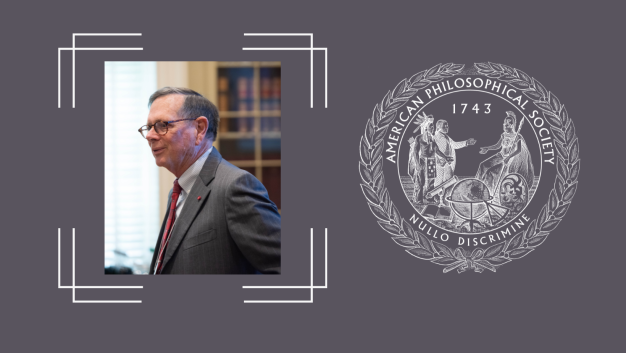Roger Bagnall Elected APS President
On April 29, 2023, Dr. Roger Bagnall took office as President of the American Philosophical Society. Dr. Bagnall is professor emeritus of ancient history and Leon Levy Director Emeritus of the Institute for the Study of the Ancient World at New York University. Among the leading historians of Greek and Roman antiquity, Dr. Bagnall enjoys an immense reputation for his work on Roman and Late Antique Egypt, its economy, and its documents on papyri and potsherds. His technical expertise in papyrology is matched by a historical mind of great range. He has also been a pioneer in the application of computer technology to the humanities.
Elected to the APS in 2001, Bagnall has long been an involved Member of the Society, serving as councilor for class four (humanities), chair of the committee on museum, a member of the committee on meetings and the committee of library and museum, curator of fine arts, and most recently, curator of art and material culture.
“I am honored by the trust that my fellow-Members of the American Philosophical have placed in me. Both the Society's support of research and its intellectual fellowship have been deeply meaningful to me. As the Society looks to advance its mission of "promoting useful knowledge" even more broadly in the coming years, I hope to play a useful part in that effort,” Bagnall said.
As President, Bagnall will oversee the operations of the nation’s first and oldest learned society. Founded by Benjamin Franklin in 1743, the APS has, since its inception, supported the advancement of knowledge in America through the election of Members who have made significant contributions to society and through the support of new research projects. Early Members included George Washington, John Adams, Thomas Paine, James Madison, Alexander Hamilton, and John Marshall. In the 19th century, John James Audubon, Maria Mitchell, Charles Darwin, and Louis Pasteur were among those elected. Albert Einstein, Margaret Mead, Robert Frost, and Marian Wright Edelman hint at the scientific, humanistic, and public accomplishments of 20th-century members.
Bagnall succeeds Pulitzer Prize–winning journalist Linda Greenhouse as President. Greenhouse is best known for her 30-year career covering the United States Supreme Court at The New York Times and currently the Knight Distinguished Journalist-in-Residence and Joseph Goldstein Lecturer in Law at Yale Law School. Other recent Presidents include renowned transplant surgeon Clyde Barker, Nobel Prize winner Baruch Blumberg, and Frank Rhodes, former president of Cornell University.
About Roger Bagnall
Roger Bagnall received his Ph.D. at the University of Toronto in 1972. He was assistant professor of classics at Florida State University for two years before moving in 1974 to Columbia University, where he served as professor of classics and history and as dean of the Graduate School of Arts & Sciences. In 2007 he became professor of ancient history and Leon Levy Director of the Institute for the Study of the Ancient World at New York University, becoming Director Emeritus in 2016 and professor emeritus in 2017. Dr. Bagnall has written or edited more than sixty books and over 250 articles, including The Administration of the Ptolemaic Possessions Outside Egypt (1976); Currency and Inflation in Fourth-Century Egypt (1985); (co-author) Consuls of the Later Roman Empire (1987); Egypt in Late Antiquity (1993); (co-author) The Demography of Roman Egypt (1994); The Kellis Agricultural Account Book (1997); The Oxford Handbook of Papyrology (2009); Everyday Writing in the Graeco-Roman East (2011); An Oasis City (2015); and Roman Egypt (2021). A brilliant and respected administrator as well as an internationally known scholar, Dr. Bagnall has served as director and president of the American Society of Papyrologists, president of the International Association of Papyrologists, and director and president of the Society for Classical Studies and is a member of the American Numismatic Society, the American Academy of Arts & Sciences, the British Academy and l'Académie Royale de Belgique. In 2019 Dr. Bagnall was appointed Honorary President for Life of the American Society of Papyrologists and Honorary President of the International Association of Papyrologists. He was elected a member of the American Philosophical Society in 2001.
About the American Philosophical Society
The American Philosophical Society, established in 1743 by Benjamin Franklin for the purpose of “promoting useful knowledge,” is the nation’s oldest learned society. An intellectual bedrock of the early United States, the APS counts nearly all of the nation’s founders as Members of the Society. Election to Membership honors those who have made exceptionally significant contributions to science, the arts and humanities, and public life. The Society promotes scholarly research through its Library, including 40 fellowships each year, and through its research grant program. The Society sustains an informed citizenry through twice-yearly meetings and topical conferences and symposia. Public programs and museum exhibitions are inspired by The Society’s Library & Museum collections, which include 14 million pages of manuscripts, 275,000 books, and approximately 3,000 artifacts and fine art objects. The collection is strongest in early American history, Native American history and culture, and the history of science. The APS Press is dedicated to publishing research that reflects a broad range of useful knowledge and is the oldest continuously operating scholarly press in the country.

